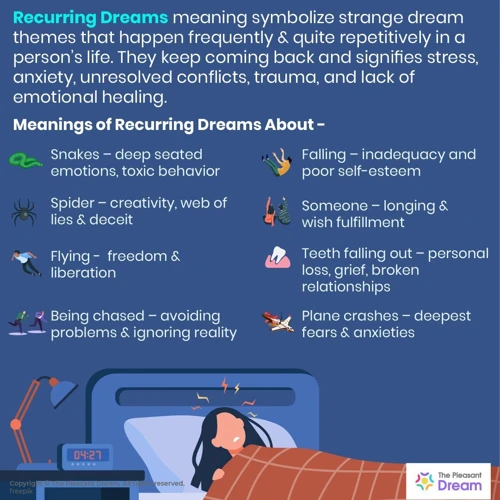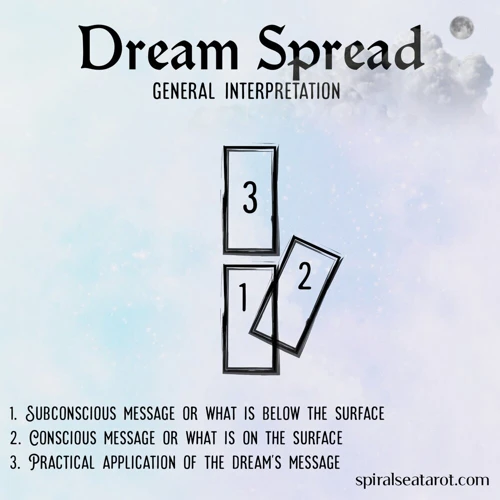Dreams have fascinated and perplexed humans for centuries as we try to unravel their mysteries. These nocturnal visions often leave us with a sense of curiosity and wonder. While many dreams may seem random and nonsensical, some recurring emotional themes emerge, offering insight into the deeper workings of our psyche. Exploring the significance of these recurring emotional themes in dreams can provide valuable self-reflection and understanding. By delving into the purpose of dreams, the role of emotions within them, and the impact of recurring themes, we can unlock the hidden messages that may hold the key to personal growth and healing. So, let’s dive into the captivating realm of dreams and explore the intricate significance of recurring emotional themes that inhabit them.
Understanding Dreams

Dreams have long been a subject of fascination and intrigue for individuals across cultures and generations. Yet, their true purpose and meaning remain elusive. Understanding dreams involves delving into their intricate nature and exploring the various elements that contribute to their formation and content. One significant aspect to consider is the purpose of dreams, which can be seen as a way for our subconscious mind to process and integrate the experiences and emotions of our waking life. Emotions play a vital role in dreams, shaping the narrative and creating a rich tapestry of feelings that can range from joy and excitement to fear and anxiety. By studying the science behind dream emotions, we gain a deeper understanding of how they reflect our waking life experiences and can uncover valuable insights into our emotional state. To harness the power of dreams as a tool for emotional self-discovery, many people use dream journaling which allows for a deeper exploration of the connections between dream emotions and our waking experiences. By examining these connections, we can gain valuable insights into our emotions and experiences, and use them as a means to grow and heal.
1.1 The Purpose of Dreams
The purpose of dreams has long been a subject of speculation and inquiry. While the exact function of dreaming remains a topic of debate among researchers and psychologists, various theories shed light on the potential significance of this mysterious phenomenon. One prominent theory suggests that dreams serve as a means for our subconscious mind to process and integrate the experiences and emotions of our waking life. Through dreams, our minds can explore unresolved conflicts, repressed desires, and unexpressed emotions in a safe and symbolic realm. Dreaming allows us to tap into the depths of our psyche, presenting us with vivid narratives and imagery that may hold deeper meanings. Additionally, dreams provide a space for problem-solving and creative thinking, as our minds continue to work on challenges even as we sleep. They can offer new perspectives, ideas, and solutions that may not have been accessible to our conscious mind. By unraveling the purpose of dreams, we gain a greater understanding of the internal workings of our mind and emotions. This understanding can be a powerful tool for self-reflection, personal growth, and emotional healing. To explore the purpose of dreams further, individuals can engage in practices such as dream journaling, where they record and analyze their dreams to uncover patterns, symbols, and recurring themes. By delving into their dreams and reflecting on the experiences, individuals can gain valuable insights into their emotions, desires, and subconscious mind, leading to a deeper understanding of themselves and their emotions. Whether dreams hold a specific purpose or not, their presence in our lives offers a unique opportunity for introspection and self-exploration. Dream journaling is one technique that can be used to unlock the hidden meanings and emotional insights that dreams may hold.
1.2 The Role of Emotions in Dreams
Emotions play a crucial role in shaping the content and experience of dreams. When we dream, our subconscious mind becomes activated, and this can lead to the surfacing of deep-seated emotions that may be suppressed or unresolved in our waking life. The role of emotions in dreams is complex and multifaceted. Dreams can evoke a wide range of emotions, including joy, fear, sadness, anger, and surprise. These emotions are often magnified and intensified in dreams, creating a vivid and immersive experience for the dreamer. The intensity of these emotions can vary from dream to dream, and they can be influenced by our current emotional state, as well as past experiences and memories. Dream psychologists and researchers have dedicated considerable effort to understanding the science behind dream emotions, seeking to uncover the underlying mechanisms that produce such intense emotional experiences during sleep. Exploring the connection between dream emotions and our waking life experiences can also provide valuable insights into our emotional well-being and psychological state. By examining the emotional themes present in our dreams, we can gain a deeper understanding of our subconscious desires, fears, and anxieties. This introspective analysis can lead to personal growth and self-discovery as we uncover patterns, triggers, and unresolved emotions that may be influencing our daily lives. Additionally, exploring the role of emotions in dreams can provide a bridge between our dream world and waking life experiences, allowing us to better understand how our emotions are interconnected and how they impact our overall well-being. By exploring this intricate relationship, we can achieve a greater sense of self-awareness and make informed decisions to enhance our emotional and mental health. To delve deeper into the science behind dream emotions, you can read more about it here. Additionally, to explore the connections between dream emotions and our experiences while awake, you can check out this article here.
Recurring Emotional Themes

Within the vast realm of dreams, recurring emotional themes emerge as significant patterns that offer a glimpse into the inner workings of our minds and hearts. Recognizing recurring themes is crucial in understanding the messages and symbolism that our dreams are trying to convey. These recurring emotional themes can manifest in various ways, such as constantly feeling overwhelmed, experiencing intense joy, or recurring feelings of fear and anxiety. These emotional patterns often reflect deep-rooted desires, unresolved conflicts, or unaddressed traumas that continue to shape our subconscious thoughts and feelings. Some common emotional themes that frequently arise in dreams include love, loss, powerlessness, and vulnerability. Understanding the significance of these recurring emotional themes allows us to unravel the underlying emotions that may be influencing our daily lives and provides an opportunity for self-reflection and personal growth.
2.1 Recognizing Recurring Themes
Recognizing recurring themes in our dreams can be a fascinating and enlightening process. These themes may manifest as specific settings, situations, objects, or even characters that appear consistently in our dreams over time. One way to identify recurring themes is by keeping a dream journal, where you can record and analyze your dreams regularly. Look for commonalities in the imagery, emotions, or events that occur in your dreams. Additionally, paying attention to patterns or symbols that frequently reoccur can provide valuable insights into recurring themes. Another approach is to engage in self-reflection and introspection, asking yourself questions such as “What emotional experiences or unresolved issues might these recurring dreams be connected to?” or “Do these themes mirror any ongoing challenges or significant moments in my life?” Taking note of these patterns and themes can help you identify the underlying emotions and messages that your subconscious mind is trying to communicate to you.
2.2 Common Emotional Themes
Common Emotional Themes in dreams can vary widely and often reflect our deepest fears, desires, and unresolved emotions. These recurring themes provide valuable insight into our subconscious mind and can help us gain a better understanding of our inner lives. Here are some of the common emotional themes that frequently appear in dreams:
1. Falling: The sensation of falling is a common emotional theme in dreams and can be associated with a lack of control or fear of failure in our waking lives. It may represent a sense of vulnerability or instability.
2. Flying: Dreams of flying often elicit feelings of freedom, empowerment, and transcendence. This emotional theme can symbolize a desire for escape, breaking free from limitations, or a sense of accomplishment and liberation.
3. Being chased: The feeling of being chased is a recurring emotional theme that often signifies anxiety, stress, or a need to confront and overcome fears or challenges in our waking lives. It may reflect a sense of being pursued or threatened.
4. Nakedness: Dreams of being naked in public can evoke feelings of vulnerability, embarrassment, or insecurity. This emotional theme may indicate a fear of judgment or a need for acceptance and authenticity.
5. Teeth falling out: Dreams about teeth falling out are closely associated with feelings of loss, insecurity, and powerlessness. This emotional theme may symbolize a fear of aging, a loss of confidence, or difficulties in communication.
6. Being unprepared: Dreams of being unprepared for an important event or situation can trigger feelings of anxiety, inadequacy, or a fear of failure. This emotional theme may reflect a lack of confidence or a need for better preparation in our waking lives.
7. Being trapped: Dreams of being trapped or unable to escape often elicit feelings of frustration, helplessness, or a desire for freedom. This emotional theme can symbolize being stuck in a challenging situation or feeling confined in a particular area of our lives.
8. Reunion with a deceased loved one: Dreams of reuniting with a deceased loved one can evoke a range of emotions, including joy, sadness, and longing. This emotional theme may signify unresolved grief, a desire for closure, or a need for emotional connection.
It is important to note that the interpretation of these emotional themes can vary greatly depending on the individual and their personal experiences. Exploring the emotions associated with these common themes can provide valuable insights into our subconscious mind and help us navigate our waking lives with a deeper understanding of our inner selves.
The Significance

The recurring emotional themes that manifest in our dreams hold significant meaning and offer profound insights into our inner workings. The significance lies in the ability to decode these emotional patterns and understand their implications in our lives. By recognizing and analyzing these themes, we can gain a deeper understanding of our subconscious desires, fears, and unresolved emotions. These recurring emotional themes often serve as a reflection of our past traumas and unresolved experiences, providing an opportunity for healing and growth. By exploring the significance of these themes, we can unravel the hidden messages that our dreams are trying to convey. These insights can then be incorporated into our waking lives, allowing us to address unresolved emotions and make positive changes. The significance of recurring emotional themes in dreams lies in their potential to guide us towards self-discovery, healing, and personal transformation.
3.1 Decoding Emotional Patterns
Decoding emotional patterns in dreams involves delving deeper into the recurring themes and emotions that manifest during sleep. By analyzing these patterns, we can gain valuable insights into our emotions and experiences that may be affecting us on a subconscious level. One approach to decoding emotional patterns is to keep a dream journal and record the details of each dream, including the emotions felt during the dream. This journal serves as a valuable tool for identifying common emotional themes that reappear throughout our dreams. Paying attention to the intensity of emotions and how they relate to specific dream scenarios can provide clues about unresolved emotions or experiences in our waking life. Additionally, exploring the symbolism and imagery associated with certain emotions can offer further insights into their meaning. It is important to approach the decoding process with an open mind, allowing for multiple interpretations and considering the context of our lives and experiences. Seeking out resources such as books, articles, or online forums that explore dream symbolism and interpretation can also aid in deciphering the emotional patterns. By decoding emotional patterns in our dreams, we can unlock a deeper understanding of ourselves and gain clarity on emotions or experiences that may require our attention and resolution in our waking lives.
3.2 Unresolved Emotions and Trauma
Unresolved emotions and trauma can have a profound impact on our dreams, often manifesting as recurring themes. When we experience intense emotions or go through traumatic events in our lives, our subconscious mind may struggle to process them fully. As a result, these unresolved emotions and trauma can find their way into our dreams, acting as a form of emotional release and processing. Dreams provide a safe space for these intense emotions to be explored and understood. They can serve as a reflection of our subconscious mind’s attempt to work through and make sense of the unresolved emotional experiences we have encountered. Unresolved emotions and trauma in dreams may take the form of vivid and disturbing scenarios, symbolic representations, or even recurring nightmares. These dreams can be unsettling and provoke strong emotional responses, but they also offer an opportunity for healing and growth. By paying attention to these recurring themes and exploring their underlying emotions, we can gain a deeper understanding of our unresolved traumas and work towards healing and resolution in our waking lives. Seeking professional guidance from therapists or counselors who specialize in trauma can also be immensely helpful in navigating the complex emotions and memories that surface in dreams. Through therapy, individuals can develop strategies to process and heal from unresolved emotions and trauma, ultimately leading to a sense of emotional well-being and peace.
Exploring Interpretations

Exploring interpretations of dreams is a captivating endeavor that involves analyzing and decoding their symbolic elements. One approach to interpreting dreams is by analyzing personal dream archetypes, which are recurring symbols or themes that hold significant meaning for the individual. These archetypes can provide insights into the subconscious mind and offer a greater understanding of our desires, fears, and aspirations. Another avenue for exploration is seeking professional guidance from dream analysts or therapists who specialize in dream interpretation. Their expertise and knowledge can help uncover hidden meanings and provide a fresh perspective on the emotional themes present in our dreams. By delving deep into the interpretation of our dreams, we can gain a heightened sense of self-awareness and tap into the reservoir of wisdom residing within our own unconscious mind.
4.1 Analyzing Personal Dream Archetypes
Analyzing personal dream archetypes is a powerful tool for gaining deeper insights into our subconscious mind. Dream archetypes are recurring symbols, characters, or themes that appear in our dreams, carrying significant meaning and representing universal concepts or patterns. By studying these archetypes, we can unravel the underlying messages and symbolism in our dreams. To analyze personal dream archetypes, it is important to first identify and document them. This can be done by keeping a dream journal and noting down any recurring symbols or themes that appear in multiple dreams. Once identified, it is helpful to explore the possible meanings and associations of these archetypes. For example, a common archetype such as water may symbolize emotions, while a snake may represent transformation or deception. Understanding the personal significance of these archetypes requires self-reflection and introspection. By delving into our own thoughts and feelings related to these symbols, we can uncover personal associations and meaning unique to our experiences. Additionally, it can be beneficial to explore the collective unconscious and consult dream dictionaries or psychological resources that provide insights into the broader cultural symbolism and interpretations of these archetypes. However, it’s essential to remember that personal meaning and associations take precedence over general interpretations. Analyzing personal dream archetypes allows us to tap into the deeper layers of our subconscious mind and gain a better understanding of ourselves and our inner world.
4.2 Seeking Professional Guidance
Seeking professional guidance when it comes to understanding our dreams and recurring emotional themes can provide valuable support and insights. Dream analysis is a field that has been practiced for centuries, and there are experts who specialize in interpreting the symbolism and meaning behind our dreams. These professionals, such as psychotherapists, psychologists, or counselors, have in-depth knowledge and experience in working with dreams and can help uncover the underlying messages and themes that may be hidden within. Working with a professional can offer a structured and informed approach to exploring the significance of our dreams. They can provide a safe space for us to share our dreams and emotions, and guide us in understanding the patterns and symbols that arise. Through their expertise, they can help us gain deeper insights into the unresolved emotions and experiences that may be surfacing in our dreams. Additionally, they can offer tools and techniques for working through these emotions and integrating them into our daily lives. Whether it’s through dream analysis, talk therapy, or other modalities, seeking professional guidance can be a transformative step in unlocking the power of our dreams and recurring emotional themes.
Self-Reflection and Action
Self-reflection and action are key components in harnessing the power of recurring emotional themes in dreams. Journaling and reflecting on these themes can provide a dedicated space for introspection and exploration. By keeping a dream journal, individuals can record their dreams, including the emotional themes that arise. This practice allows for a deeper understanding of the patterns and recurring emotions within dreams, providing valuable insights into one’s mental and emotional state. Additionally, incorporating the emotional insights gained from dreams into daily life can lead to personal growth and transformation. It may involve taking proactive steps to address unresolved emotions and traumas, seeking therapy or counseling, or engaging in activities that promote emotional well-being. Through self-reflection and action, individuals can harness the power of their dreams to bring about positive change and enhance their overall emotional and mental well-being.
5.1 Journaling and Reflecting on Emotional Themes
Journaling and reflecting on emotional themes in our dreams can be a powerful tool for self-discovery and personal growth. When we write down our dreams in a journal, we create a space to explore and analyze the emotions that arise within them. This process allows us to revisit the details of our dreams and identify recurring emotional themes that may be present. By journaling, we can gain a better understanding of the patterns and symbols that emerge, as well as the emotions that accompany them. It is essential to reflect on the emotional themes that appear in our dreams and consider their relevance to our waking life. Are these emotions familiar? Do they reflect unresolved feelings or experiences? Through reflection, we can make connections between our dream emotions and our daily life experiences, helping us gain insight into our thoughts, behaviors, and emotional well-being. To facilitate this process, it can be helpful to create a list or table in our dream journal that categorizes and organizes the different emotional themes we encounter. This allows us to track their recurrence, intensity, and any shifts or changes over time. By observing these patterns, we can identify areas of emotional growth or areas that may require further attention or exploration. It is important to approach journaling and reflection with an open mind and non-judgmental attitude, allowing the emotions to arise and be observed without criticism. By engaging in this practice consistently and with intention, we can deepen our understanding of ourselves and make meaningful strides towards emotional healing and self-discovery.
5.2 Incorporating Emotional Insights into Daily Life
Incorporating emotional insights gained from our dreams into our daily lives is a powerful way to enhance self-awareness and personal growth. Once we have taken the time to analyze and reflect on the recurring emotional themes in our dreams, we can begin to identify patterns and connections between our dream world and our waking reality. Incorporating emotional insights into daily life involves being proactive in recognizing these patterns and actively applying the lessons learned from our dreams to our everyday experiences. For example, if a recurring theme in our dreams is feeling overwhelmed and anxious, we can take steps in our waking life to manage stress and practice self-care. This might involve incorporating relaxation techniques such as meditation or setting boundaries to create a healthier work-life balance. Additionally, exploring and nurturing the positive emotional themes in our dreams can be equally beneficial. If our dreams consistently feature feelings of joy and fulfillment, we can seek out activities and relationships that evoke these emotions in our waking life. By intentionally integrating the emotional insights gained from our dreams into our daily routines, we can create a more harmonious and fulfilling existence. It is important to remember that this process takes time and patience, as change and growth are gradual. However, with dedication and self-reflection, we can cultivate a deeper understanding of ourselves and live more authentically aligned lives.
Conclusion
Conclusively, exploring the significance of recurring emotional themes in dreams can provide profound insights and revelations about our inner selves. The enigmatic world of dreams offers a unique lens through which we can examine our emotions, experiences, and subconscious mind. By recognizing and deciphering recurring emotional themes, we can unravel the patterns and messages they hold, offering us a deeper understanding of our innermost desires, fears, and unresolved issues. Decoding emotional patterns within dreams can act as a catalyst for personal growth and healing, allowing us to address unresolved emotions and traumas that may be impacting our daily lives. Whether through analyzing personal dream archetypes or seeking professional guidance, delving into dream interpretations can open doors to self-discovery and transformation. Self-reflection and action are essential steps towards incorporating the insights gained from dream exploration into our daily lives. Journaling and reflecting on emotional themes can help us develop a greater awareness of our emotions and their connections to our experiences. By actively incorporating these emotional insights into our daily routines, we take proactive steps towards personal growth and positive change. In conclusion, the significance of recurring emotional themes in dreams cannot be underestimated. They serve as powerful messengers, offering us glimpses into the depths of our subconscious minds and guiding us towards a more authentic and fulfilling life.
Frequently Asked Questions
1. How do dreams help us understand our emotions?
Dreams serve as a pathway for our subconscious mind to process and integrate our emotions. By examining the emotional themes that recur in our dreams, we can gain a deeper understanding of our underlying emotions and experiences.
2. Can recurring emotional themes in dreams indicate unresolved issues?
Yes, recurring emotional themes in dreams can often be a sign of unresolved issues or unresolved emotions in our waking life. These themes can provide important clues and serve as a starting point for self-reflection and personal growth.
3. Are there common emotional themes that appear in dreams?
Absolutely! Common emotional themes in dreams include fear, love, anger, sadness, and joy. However, the specific content and context of these emotions can vary significantly from person to person.
4. How can we recognize recurring themes in our dreams?
Recognizing recurring themes in dreams involves keeping a dream journal and documenting the emotions, symbols, and events that occur in your dreams. Over time, patterns and recurring themes will start to emerge, providing valuable insights into your subconscious mind.
5. Can recurring emotional themes in dreams be related to past trauma?
Yes, recurring emotional themes in dreams can sometimes be linked to past trauma. Dreams can serve as a means for our subconscious mind to process and heal from traumatic experiences, allowing us to gradually release unresolved emotions.
6. How can we analyze our personal dream archetypes?
Analyzing personal dream archetypes involves examining the recurring symbols, characters, and themes in our dreams. These archetypes can represent different aspects of our personality or reflect specific emotions or experiences that hold significance in our lives.
7. Is seeking professional guidance important when exploring dream interpretations?
While it can be valuable to explore dream interpretations on your own, seeking professional guidance, such as from a therapist or dream analyst, can provide a deeper understanding of the symbolism and meaning behind your dreams. Professionals can offer insights and perspectives that you may not have considered.
8. How can journaling and reflecting on emotional themes in dreams benefit us?
Journaling and reflecting on emotional themes in dreams allows us to gain clarity and self-awareness. It provides a space for us to explore our emotions, experiences, and patterns, helping us to identify areas of growth, find resolution, and improve our overall emotional well-being.
9. Can insights from dreams be applied to our waking life?
Yes, the insights gained from exploring recurring emotional themes in dreams can be applied to our waking life. By incorporating these insights, we can make positive changes, resolve conflicts, and develop a deeper understanding of ourselves and others.
10. How can we incorporate emotional insights from dreams into our daily life?
We can incorporate emotional insights from dreams into our daily life by being mindful of our emotions, reflecting on the messages and lessons from our dreams, and taking appropriate action to address any unresolved issues or emotions. This may involve seeking support, engaging in self-care practices, or making positive changes in our relationships or habits.








